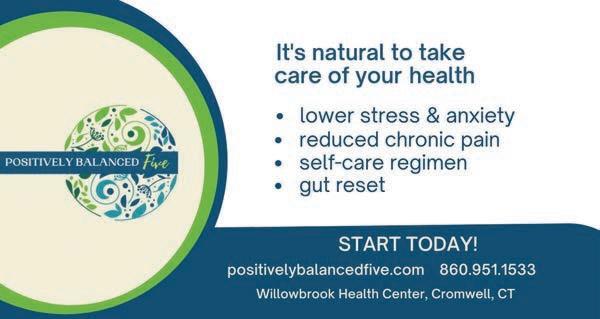
9 minute read
Is Your Spirit in Need of a Tune-Up?

Advertisement
—Stuart Alpert and Naomi Lubin-Alpert
by Stuart Alpert and Naomi Lubin-Alpert
As humans, we have feelings of discomfort and dis-ease in us. These feelings include depression, anxiety, fear, agitation, meaninglessness, loneliness, longing, alienation, isolation, shame, ambivalence, tension, pain, and feeling overwhelmed or dissociated. This list is not exhaustive; there may be other feelings that cause you discomfort and dis-ease. These feelings are indications of our being out of balance and disconnected from our heart, our spirit, and our life force. It’s possible to be understanding and compassionate toward these feelings so that we develop a more intimate connection with ourselves. This intimate, supportive relationship helps us feel more balanced, whole, vibrant, and alive. Developing understanding and compassion also becomes the path to expanded consciousness. We begin the journey to expanded consciousness by accepting that there is work to be done in the depths of our emotional life. This work has to do with clearing out the negative, harmful energies from our childhood. The energies we absorbed from any abuse and neglect of our childhood are still in our bodies and in the neural wirings of our brain. The abuse is also in the beliefs we have about how to live with our emotions and body experiences. How we have become organized in relation to the abuse determines how we feel about ourselves, how we comfort ourselves, and the quality of safety and protection we embody
The Pit Crew
Entering the depths of our feelings can be compared to being members of a racecar support team in the pit of a racetrack. The pit crew changes the car’s tires and oil and tends to engine problems so the driver can continue the race. The pit is where the hard, messy work takes place. The work in the pit of our emotional and physical life can also feel messy and hard. It requires a dedication fueled by our Spirit’s natural drive for greater aliveness and a deeper connection to our heart. The pit work is well worth the results. It is vitally important, however, to know that we don’t have to enter the pit blindly or alone. Much as the pit crew has the knowledge of what needs to take place for the driver to continue, we have a roadmap that helps us understand how transformation occurs. The roadmap lets us know where we are in the process of transformation and what needs to occur to remain on track; it does not, however, save us from needing to live each experience that opens in our process. In real time, the pit crew can’t do its work by reading a book. They need to be willing to get their hands dirty.
Where Do We Begin?
We begin by exploring the nature of how we keep ourselves safe. We often have old, outdated beliefs about safety and protection that limit our consciousness, our aliveness, and our feeling of wholeness. As an old TV commercial pronounced, “Without regularly changing the oil in our car, we may need a major engine job down the road.” The same concept applies as we examine our old belief systems—if we ignore the signs that indicate that we are out of balance, these symptoms will intensify until we finally get the message. When we organize ourselves around old beliefs of safety and protection that originated from past abuse and neglect, we are ignoring what we now need so that the “engine” of our life to be in good running order. It is as though we are not changing the oil that lubricates elements of ourselves; we remain stuck or resist tending to the meaning of our breakdowns. Without being able to read our

distress signals, our emotional, physical, and mental engine begins to rattle and run rough. We often believe we don’t have support to accept and support our feelings, reinforcing a feeling that is akin to driving with a set of worn-out shock absorbers—we have a sensation of bouncing around inside of ourselves. There may simply not be the correct amount of gas and oxygen flowing through our internal carburetor that allows us to feel alive and energetic. With these difficulties, the engine of our life won’t run smoothly and efficiently. We can learn to decode our emotional and physical symptoms as messages from the deep place of wisdom that is in all of us. With this connection, we can allow our symptoms to inform us about the next piece of old abuse or neglect calling for our attention. When symptoms surface, they are calling to us to meet them with the understanding, caring, and compassion that they have always needed. Once we acknowledge our trauma and its resultant pain, we are on the path to greater consciousness.

An Emotional Guide on Your Journey
It is worth restating that the journey can have difficult and painful twists and turns that require dedication in its pursuit. This is also worth the effort. The journey needs the guidance of an experienced hand; a therapist who is unafraid of deep emotion and who knows how to be with their client’s distress. As clients, we are supported in our distress and accompanied on our journey. This is the essence of good bonding. Therapy allows us to update our old beliefs formed from exposure to childhood abuse and neglect. This process is rewiring the embodied messages that tell us when our internal engine needs tending. As we alter the software of our beliefs, we begin to transform the hardware of our body
Integrative & Functional Medicine For:
• Women's Health • Depression and Anxiety • Children and Families • Hormone and Gut Imbalances • Chronic Disease Support • Tick-Borne Illnesses
Ask About Our Natural Cosmetic Services:
Platelet Rich Plasma (PRP) Treatment, Microneedling & IV Nutrient Therapies
Alina Schneider, APRN Jennifer Letitia, MD
Bob Robles, L.Ac
1420 Main Street, Suite 124, Glastonbury, CT 860.430.5300 ctrforholistichealthcare.com

organization. Updating our software so that transformation can occur is a simple concept—but simple doesn’t mean easy! Knowing this concept is only the first step. The real work is to continue to clear out the old abusive energies that have determined how we deal with our emotions and how we feel about ourselves.
Living Our Experiences
It is essential to note that healing is not about right and wrong, good and bad. There are no “right” or “good” emotions, senses, and thoughts. Being judgmental about what we feel, sense, and think only creates more problems for us. The very nature of being judgmental is to be at war with ourselves. Judgment of self (or others) keeps us away from living more grounded and coming home to our bodies—bringing consciousness and acceptance to our emotions. When we judge ourselves, we are living in our minds and looking down at our experience. Experiences are pleasurable or unpleasurable, supported or unsupported, grounded or ungrounded. They are all simply experiences that we either accept or reject. The consequence of rejecting parts of ourselves is that we perpetuate less clarity, aliveness, and intimacy. Rejecting or judging our inner experiences, moreover, creates tension and stress. Conversely, accepting our inner experiences means we don’t have to attempt to rid ourselves of anything we feel or think; we can simply focus and allow each experience to be a wave we learn to ride. As we bring consciousness to each moment, we don’t compartmentalize ourselves into acceptable and unacceptable, into “I’ll allow myself to feel this, but not that.” All of what we feel becomes acceptable (although not necessarily comfortable) and is part of being human. We can then be supportive and kind to ourselves no matter what we feel, think, or sense. We are now living inside of ourselves, rather than judging our feelings from on high. How deeply we open to ourselves has to do with the depth of our self-acceptance. Conversely, the intensity of our resistance to what we feel creates the intensity of our self-rejection. Acceptance and compassion allow for a relaxed body; rejection causes stiffness, collapse, or degrees of formlessness. It is our mind that rejects what we feel. The question that we need to ask ourselves is whether we want to live in a way that produces openness, insight, honesty, consciousness, and harmony. Do we want to live in a way that supports living in our center and in relation to the ground? Or do we want to live in a way that supports tension or formlessness, resistance, disharmony, pain, and dissatisfaction? We can also ask ourselves whether we need to hold onto old beliefs that may perpetuate a way of living that diminishes breathing, motility, and mobility. Do we want to move beyond preconceived notions and the limits we impose on ourselves about the degree of aliveness that is possible, or do we want to explore the world of endless possibilities?
Embrace Your Personal Power
Implicit in these questions are further questions. What is the feeling of integration, wholeness, and personal power? Do you believe that personal power—when all parts of who we are operate together due to the alignment of our energy and emotions in our body—is the ability to control ourselves and others so that we don’t have to feel what is real and alive in us? That is, is personal power the ability to organize ourselves against whatever we feel or is the ability to make room for whatever it is that opens in us? Our answer to these questions requires a paradigm shift wherein personal power is about building self-acceptance for all our experiences. Within this paradigm, personal power is the accumulation of energy so we can hold our focus on all of our experiences and not have to deny or obsess about them. In this paradigm, we are in a continual process of increasingly collecting power that supports consciousness so we can live our lives in a way that is congruent with our biology and our spirit. Living in this way, we don’t have to organize our body in resistance to ourselves. As we increasingly accept our inner experience, we create an energy of congruence, love, respect, and aliveness. Impermanence is all we are assured of. Change is always occurring in the universe. The only real question that remains for us is whether we will make room for transformation to occur in our internal universe. Again, change is inevitable. It is important to note that we are always living in relation to others and the entire universe. In this way, we interact with those around us and with our environment. When we support this awareness and support ourselves, we have already won our race. •
This article was edited and is from the Hartford Family Institute Training Manual for our Professional Training Program in HFI Body-Centered Psychotherapy. The manual can be purchased by going to www.hartfordfamilyinstitute.com. See ad on page 37 >







